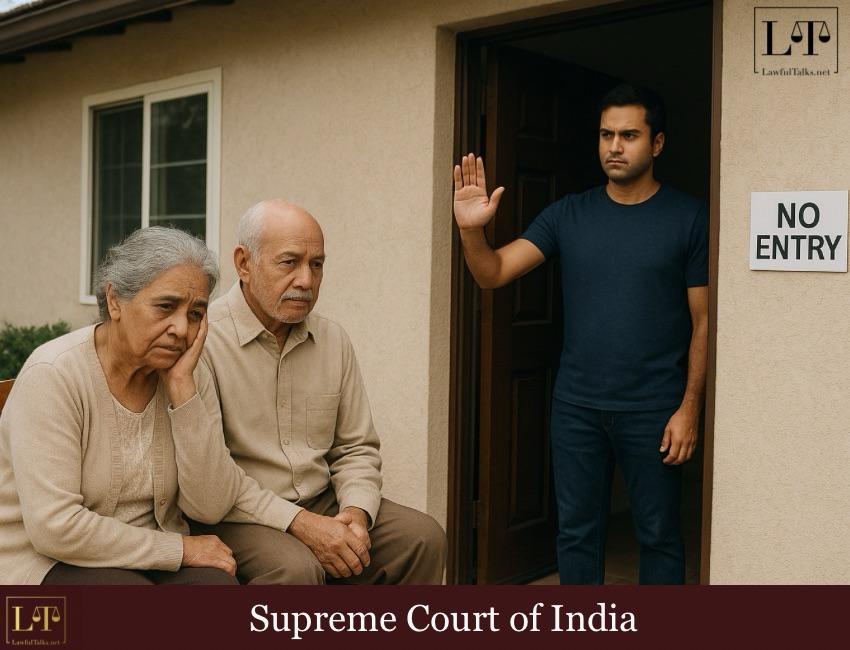Allahabad HC Sets Aside Afzal Ansari's Conviction, Allows Him to Continue as MP

The Supreme Court has clarified that under the Maintenance and Welfare of Parents and Senior Citizens Act, 2007, a Tribunal can order the eviction of a child from the property of senior citizen parents if the child does not meet their legal duty to support them.

A Bench of Justice Vikram Nath and Justice Sandeep Mehta allowed the appeal filed by an 80-year-old man and his 78-year-old wife, and set aside the Bombay High Court’s order, which had earlier quashed the eviction directive issued against their eldest son.
The Court emphasized that the Act was enacted to safeguard senior citizens by ensuring their care and protection, and, accordingly, its provisions must be interpreted in a manner that furthers this welfare objective.
"The framework of the Act clearly notes that the law was enacted to address the plight of older persons, for their care and protection. Being a welfare legislation, its provisions must be construed liberally so as to advance its beneficent purpose," the Court observed.
Facts:
The appellant, Kamalakant Mishra, an 80-year-old senior citizen, along with his 78-year-old wife, sought relief after their eldest son occupied their properties (Room No. 6, Nagina Yadav Chawl, and one room in Raju State, Bengali Chawl, Mumbai). On 12th July 2023, the parents filed an application under Sections 22, 23, and 24 of the Act, seeking both maintenance and eviction. The Tribunal, in this case, directed eviction and ordered a monthly maintenance of ₹3,000 in favour of the parents on 5th June 2024, which was later upheld by the Appellate Authority on 11th September 2024.
The Apex Court found that the eldest son (Respondent No. 3), who is financially sound and runs a business, had taken possession of two properties owned by the appellant and his wife in Mumbai and denied his elderly parents the right to reside in them after they had moved to Uttar Pradesh. The Court held that by preventing his parents from accessing their property, the son had acted in "breach of his statutory obligations" and was thereby "frustrating the very object of the Act."
The High Court had held that the orders of the Tribunal lacked jurisdiction to evict the son since he also qualified as a senior citizen under the Act. The Supreme Court, however, held this reasoning to be incorrect. Clarifying the legal position, the Court ruled that the relevant date for determining whether a person is a senior citizen is the date on which the application is filed before the Tribunal. Since the application was filed on 12th July 2023, when the son was 59 years old, he could not be treated as a senior citizen under Section 2(h) of the Act.
Accordingly, the Supreme Court allowed the appeal, set aside the High Court’s judgment, and dismissed the writ petition filed by the son. The Bench granted him two weeks to furnish an undertaking to vacate the premises on or before 30th November 2025, failing which the Tribunal’s original order could be executed forthwith.
Case title : Kamalakant Mishra v. Additional Collector and others., SLP(C) No. 026348/2025
Advocates For Petitioner(s) : Ms. Deeksha Saggi, Adv. Mr. Abhishek Usha Singh, Adv. Mr. Rishabh Singh, Adv. Mr. Gaurav Mishra, Adv. Mr. Rituparn Uniyal, AOR For
Advocates For Respondent(s) : Mr. Navneet Dugar, AOR Mr. Jainam Vimal Gadiya, Adv. Mr. Pawankumar Shrinath Pal, Adv.
Leave a Comment

Sanika Patil
Third Year BALLB Law Student
Latest Posts
Categories
- International News 19 Posts
- Supreme Court 306 Posts
- High Courts 318 Posts






























































































































































































































































































































































































































































































































































































































































